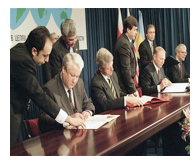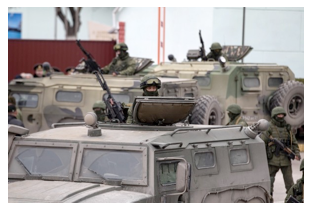PERSPECTIVE-The crisis in Ukraine is more fluid than our recent wave of sopping weather in Los Angeles.
The other night, I listened to an interview on Al Jazeera America (here is the link to the broadcast, but it only covers a small segment). The commentator discussed the roots of the Kiev uprising with two guests. While their credentials were impressive, the insight they offered was based only on recent developments and ignored the deliberate actions of the former USSR and the Russian Federation that have played out over the decades.
The guests blamed the United States, not Putin, for the unrest in Ukraine.
They based their opinion on a statement Putin made a few weeks ago that suggested he would support a course satisfactory to both the EU and Russia, one which the United States dismissed in favor of allowing self-determination by Ukrainians. In their view, American reluctance to Putin’s undefined overture opened the door to the demonstrations and violence in Kiev.
The guests clearly overlooked the fact that Putin and Russia set the stage for the confrontation.
It is easy to act like a statesman, as Putin did, when he and his predecessors have done everything possible to stack the deck in Ukraine. The combination of Stalin’s starvation of millions of Ukrainians, combined with a persistent policy of Russification by the Soviet Union designed to suppress Ukrainian culture, effectively embedded a pro-Moscow element.
In August 2012, deposed president Viktor Yanukovych put the icing on the cake by allowing Russian to serve as an official language in a region if it was the native tongue of 10% of the population. Putin even supports a measure allowing dual citizenship, which would make it easier for Moscow to manipulate politics in Ukraine.
It was a more effective strategy than sending in the Red Army as an occupation force, although Stalin did that as well. It set up the present ethnic division that is likely to split the nation into two … an insidious undermining of Ukraine’s sovereignty.
As a result of this demographic warfare, most of Ukraine’s GDP is in the anti-EU eastern region.
Knowing how Russia orchestrated this virtual attack on sovereignty does not make it easier to deal with.
Already, Russian military units are patrolling the Crimea peninsula with no credible force to oppose them. Other cities in the eastern Ukraine will probably be in a similar state before long. The Ukrainian Army cannot match their firepower. For that matter, there is no telling how many of its troops might be sympathetic to Moscow.
There are two prospects for a unified Ukraine: slim and none.
In order to stem Putin’s tide, the new government of Ukraine must position loyal troops in key western areas. Odessa, a major seaport on the Black Sea, is essential to secure. Even there, one might expect pushback from a pro-Moscow faction. Having access to the Black Sea will be critical for the economy of any region governed from Kiev.
 Ukrainian troops have been ordered to protect nuclear power plants and other key installations. There have been confrontations where they have refused Russian military requests to disarm.
Ukrainian troops have been ordered to protect nuclear power plants and other key installations. There have been confrontations where they have refused Russian military requests to disarm.
It is a matter of time before the Ukrainian parliament asks NATO for assistance. Russia is in clear violation of a 1994 treaty which guarantees the sovereignty of Ukraine – a treaty the United States, United Kingdom and Russia signed, so a case can be made for intervention by the NATO allies.
But what would that intervention amount to?
Sanctions are being considered, but they will have to be harsh in order to get Putin’s attention. It is interesting that he did not apply sanctions against Ukraine and immediately escalated to putting boots on the ground – or perhaps jackboots. The Ukrainian government and military were not threatening Russian-speaking citizens. It was a compulsive move consistent with the Russian objective of annexation.
No one wants to set the stage for a potential armed conflict between the superpowers. Besides, geography would make it extremely difficult to support a large operation.
A possible solution would involve embedding small contingents of NATO observers with Ukrainian forces. Although Putin is an imperialist hell-bent on controlling Ukraine, he would not want to risk a potentially costly war by allowing his forces to fire upon any formation containing elements from the western allies. The objective of the observers would be to avoid fighting and, instead, serve as a deterrent, similar to the role of the small force the Allies maintained in West Berlin during the Cold War.
 Such intervention would require using Poland as a base. The Warsaw government is a strong supporter of the present government in Kiev and would be receptive to this role if NATO, particularly the United States, wholeheartedly backed it.
Such intervention would require using Poland as a base. The Warsaw government is a strong supporter of the present government in Kiev and would be receptive to this role if NATO, particularly the United States, wholeheartedly backed it.
I would imagine Canada, which has a large ethnic Ukrainian population, would consider participation if the US were on board. The UK and France would probably join in, too.
If we allow Russia to consolidate its control over most of Ukraine, then we may as well get the hell out of Europe and allow Putin to bully all of the former Soviet satellites into submission. Lack of action by the United States, Canada and their European allies would effectively endorse Putin’s playbook for a controlling stake in world affairs.
(Paul Hatfield is a CPA and former NC Valley Village board member and treasurer. He blogs at Village to Village and contributes to CityWatch. He can be reached at: [email protected])
–cw
CityWatch
Vol 12 Issue 19
Pub: Mar 4, 2014
